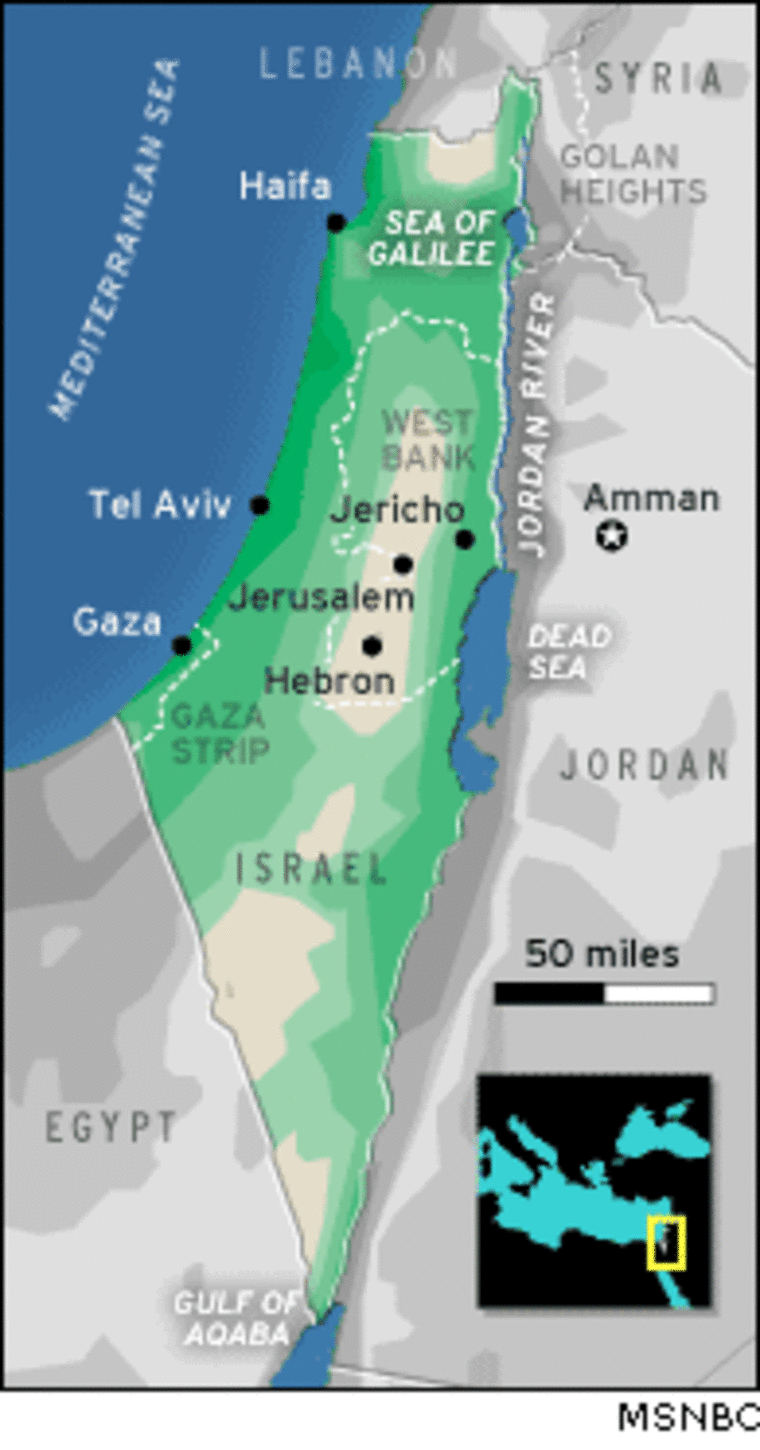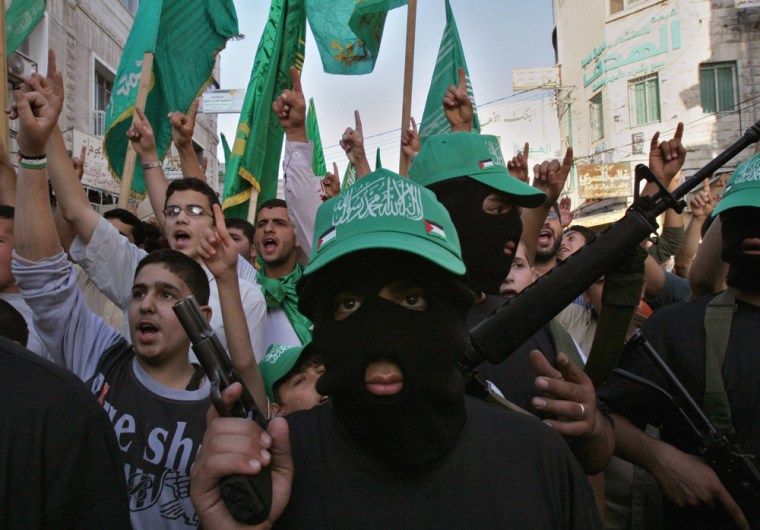RAMALLAH — There has been a serious increase in the violence between Palestinians in the last few weeks, strife that has led to the death of at least 20 in clashes between the major Hamas and Fatah factions.
NBC News’ Martin Fletcher visited Ramallah, the administrative capital of the West Bank, on Wednesday and reports on the infighting and its origins.
There are several reports indicating that civil war could erupt among the Palestinians. How realistic are these fears?
The fears of a civil war are very realistic and are shared by almost everybody.
Mohammed Dahlan, who is considered the key player in Gaza apart from the prime minister maybe — and who used to head the security down there — said on Tuesday that they are going quickly towards civil war.
But, that said, it is also a sort of boogie man. The threat of civil war is being put forward as the reason why various steps have to be taken.
It’s a real threat, but it’s also not necessarily going to happen.
What happens is that every time there are two or three days of serious fighting between Fatah and Hamas, then the leaders meet and they agree to pull back from the brink.
That’s what happened on Wednesday. President Mahmoud Abbas [who heads Fatah] met with [Hamas] Prime Minister Ismail Haniyeh in Gaza and they agreed that they will pull off the streets the new Hamas military force of 3,000 men and ultimately they’ll be blended into the official security forces. In other words, they’ll join the police forces.
But they’ve made that agreement before and it’s never happened. Even when they agreed on it on Wednesday, they didn’t say when it would happen.

But until they do that, there will always be this fear that they are going to fight each other, and that’s what’s happening.
So you get the Fatah militias versus the Hamas militias fighting routinely. Whenever it gets very serious, their leaders meet and pull it back from the brink. But, whenever the next provocation happens within a week or two, they are back at each other.
With the latest violence, who is directing the violence against Hamas? Are the Fatah militias working totally independently of Abbas?
Again, it’s not exactly clear. Different groups are fighting for different reasons.
Often times, a person gets hurt or killed and then the family of that person wants revenge. That’s what happened here two days ago when a Hamas figure was killed; the Hamas family then surrounded a Fatah police station and demanded that the Fatah person who killed their family member be handed over to them. Fatah refused, of course, so there was more fighting.
At other times it’s an official organization, or the police, who are well organized and listen to their officers when they are told to go out and fight Hamas. That’s happened several times. And Hamas is the same way when they are told by their leaders to go and fight Fatah.
Each side is using the violence for their own aims. But each side also is pulling back from civil war. The question of course is, how long can you play with fire before you get badly burned?
What about Abbas? He is continuing to advocate negotiation with Israel, but he is a lone voice and is facing increasing political isolation. Is he going to be able to maintain power?
Abbas is one of the few in the Palestinian leadership who genuinely thinks violence does not further peace, does not serve the Palestinian cause, and he wants it to stop. And this is leaving him in a very dangerous position because not only does Hamas not respect him, but many of his own people in Fatah also don’t respect him — they think he’s too weak.
But he has a trick up his sleeve. His referendum, due to take place on July 26 and based on what is called the “Prisoner’s Document,” means recognizing Israel and a two-state solution. That’s considered by many, within the Palestinian sphere, to be a stroke of genius. All the opinion polls say that about 80 percent of the Palestinian people support the idea of the referendum.
At the same time, if he wins the referendum, it doesn’t mean that he can actually begin to negotiate peace with the Israelis because the Israelis have already said that the referendum idea is a waste of time.
So, it is a good move in terms of Palestinian infighting and it is saving his position for the time being because suddenly he has found support from the people on that particular issue. But, it doesn’t look like in reality it would go anywhere at all because Israel says it is a waste of time, and they won’t use it for the basis of negotiations.
So, is the July 26 referendum expected to go actually happen?
It’s not clear. It’s clear that Abbas wants it to go forward. Fatah wants it to go forward. Hamas does not want it to go forward. Israel says even if it does go forward, it doesn’t mean anything.
So, you’ve got all of those counter-forces. The issue really is whether they are actually physically capable of organizing a legitimate national referendum by July 26 if the Hamas government is against the whole thing. [Abbas was elected president in 2004; Hamas, which won a parliamentary majority in elections earlier this year, runs the cabinet and government. A similar situation in the United States would be if the president were, say, Republican and the Congress was run by the Democrats.]
The question is, how are you going to organize it of the government is against the whole thing. How are you going to organize it if the government doesn’t want to do it?
And you have the government’s militia — the Hamas militia — who may well sabotage the whole thing.
On the one hand it’s a brave move by Abbas. But it's also a very provocative move and a very dangerous one, because if the president calls a national referendum but is unable to carry it out because of sabotage by his own government, where does that leave the political framework of the Palestinians? In anarchy.
At the same time as all of this is going on, Hamas hasn’t been able to pay civil servants for months. How much ground are they losing on this issue?
They’re losing support quite dramatically and it is is going to Fatah. Therefore Hamas is desperately trying to bring in money to pay the salaries.
The news on Wednesday of course was that Palestinian Foreign Minister Mahmoud al-Zahar brought in a suitcase with $20 million dollars in cash in it. So that shows you to what degrees they are going to try to pay the salaries.
But one of the government employees from the Palestinian parliament that I spoke to today in Ramallah told me that if Hamas is able to pay the salaries a few days before the referendum, that would dramatically change the support for the referendum, and that support could go back to Hamas.
So, if there is a referendum, Hamas would love to be able to pay the salaries before then, because it could maybe help them win the referendum.
Therefore, clearly, it's in the interest of Fatah not to pay the salaries before the referendum because the people struggle and are in trouble, the more they’ll turn against Hamas and the more likely Fatah will be to win the referendum.
So it seems to be in the interest of the government not to pay the salaries. So, that’s a bit of a paradox.
Overall, the Palestinian people are in dire straits. People in the private sector are getting their salaries, but everyone in the public sector, who rely on the government for their salaries and is a big proportion of the population, is in desperate straits.
They are in their fourth month now without a salary. These are people who don’t have many savings anyway. The average salary is about $400 a month. That’s all. And they haven’t gotten that for at least the last three months.
The guy I was speaking to today in Ramallah said that he has already exhausted his savings. He said that his daughter has been begging him for a doll for the last month. He said he finally bought it for her and he had tears in his eyes as he told me.
If you ask how people live, they say that families are just helping each other out. People with private sector salaries are giving food or money to relatives in the public sector. Or they are borrowing money, but they don’t when they are going to be able to pay it back and people are getting fed up with giving away their own money.
